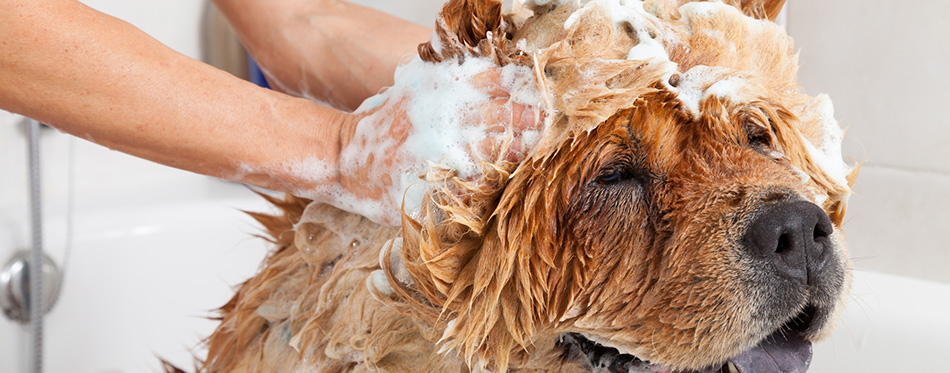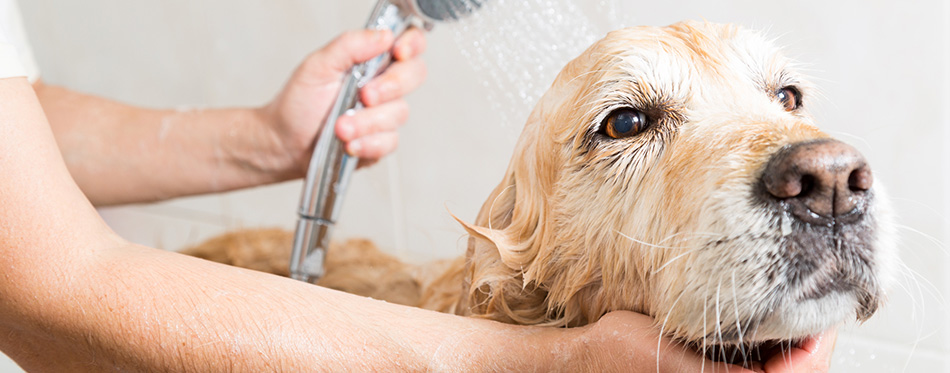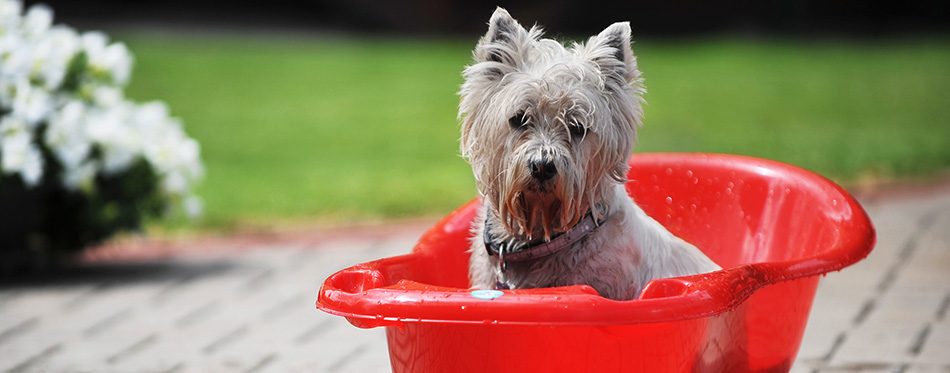Every time we give our pet dog a bath, we have this expectation that it will stay smelling fresh and clean until their next bath. After all, that’s how it is with us, right? But then again, we don’t really go out and roll on the grass, play with dirt, dig up the soil in our backyard, and even pick up dog poop and garbage occasionally. Our dogs do. So, if our pets suddenly come home really smelly, that’s perfectly okay. However, if you notice your dog to be rather stinky even right after taking a bath, then you are potentially looking at a number of health problems. But what makes our dog stink even after a bath? Let’s find out.

Inadequate Drying
You may not realize it, but inadequate drying of your dog’s coat is one of the most common causes of strong dog smell after a bath. This is inherently tied to the production of sebum – a kind of oil produced by certain glands inside the dog’s skin. Sebum is important since it provides a protective layer for the skin. It collects on the follicles and shafts of each hair so that moisture from within the dog’s skin doesn’t leach out and evaporate. Unfortunately, this can also be a great medium for the growth of certain bacterial species.
When you give your dog a bath and you do not dry its coat completely, the remaining water on your dog’s skin and hair can hasten the rate of such bacterial growth since these microorganisms require a rather moist environment to thrive. These bacterial species can produce a characteristic stink that we now associate as the ‘dog smell’. It is, therefore, imperative that you dry your dog’s coat and skin thoroughly and completely after giving it a bath. Ordinary drying with a dog towel is simply not enough especially if your dog has a thick double coat. A pet hair dryer should do the trick.
Ear Infection
Veterinarians can tell right away if your dog has an ear infection. The moment it enters the clinic, the smell is often enough to tell vets that your dog’s ears may already be infected. This is, of course, aside from the associated symptoms of shaking and scratching its head.
Ear infections in dogs can be caused by ear mites that live in the dog’s ear canal. These pests feed on organic material, mostly skin debris, found in the ears. The resulting inflammatory reaction can elicit a characteristic smell. Aside from ear mites, other organisms that can wreak havoc in your dog’s ears include fungi such as Malassezia pachydermatis and bacteria like Staphylococcus intermedius.
These microorganisms can produce a nasty smell that can never be removed by bathing. As a matter of fact, it can be worsened by bathing especially if water inadvertently gets inside your dog’s ear. This can make the environment inside the ear more inviting for microorganisms. The other problem is that many pet parents do not really pay attention to their dog’s ears whenever bathing. As such, these should also be cleaned right after bathing and dried thoroughly.
To address the ear infection, the vet can give you a medicated ear drops to put into your dog’s ears. It is important to adhere to the instructions if you want to get rid of the infection and the concomitant stink.
Check out our guides on Dog Bathtubs, Dog Shampoos and Dry Shampoos for Dogs for more info.
Problems with the Teeth and Gums
Another reason why your dog may stink even after taking a bath is that it may have some serious periodontal or gum disease. This occurs when the teeth of your dog are already decayed such that bacteria and fungi are already proliferating deep within the tissues of the teeth. This is different from halitosis or bad breath which is another possible reason why your dog stinks even though you spent hours bathing it.
As microorganisms eat away at the teeth of your dog, they keep on producing metabolites that interact with your dog’s saliva. This can produce a really bad smell. However, just like dog stink coming from an infected ear, dogs that smell because of tooth decay and infected gums only have fungi and bacteria to blame. That is why it is crucial to brush your dog’s teeth on a daily basis using only a toothpaste that is formulated specifically for canine pets. It is also important to use a dog toothbrush that will help remove plaque and tartar which are basically the protective structures set up by microorganisms. These have to be removed. For a wider selection of choices, check out our dog toothpaste guide.
Unfortunately, brushing alone may not help especially in the case of tartar buildup. Having a veterinary dentist take care of your dog’s teeth can help. In some instances, the severely-decayed tooth may have to be extracted and the root thoroughly cleaned. If there is infection especially in the gums, the vet can prescribe a medicated toothpaste to be used for your pet. Alternatively, an oral antibiotic may be prescribed.

Bad or Smelly Breath
We mentioned above that having gum diseases can lead to bad breath. However, this is not the only cause of canine halitosis. Other potential causes of smelly breath in dogs can include diabetes mellitus, sinusitis, pharyngitis, tonsillitis, and even enlargement of the esophagus. With the exception of diabetes mellitus, these conditions are typically characterized by infection of the affected organ.
As always, whenever microbial infection is present, foul odor is almost always sure to follow. However, in the case of infections of the internal organs like the throat, tonsils, and sinuses, the odor produced by bacteria, fungi, or viruses is compounded by the activity of immune system cells. These can mix with the dead microorganisms to create an even nastier odor.
Perhaps an often overlooked aspect of doggie bad breath is poor nutrition. Dogs that are fed low quality diets, especially those that are filled with nutrient-poor ingredients, tend to have more severe forms of halitosis which can be amplified by other factors. Choosing high-quality dog food that contains easily digestible ingredients can help promote healthier and nicer breath. Dog dental chews can also help, especially those with bioactive enzyme systems. Other types of high-quality dog chews can also assist in the removal of plaque and food particles from your dog’s teeth and gums.
Skin Inflammation
When the skin gets inflamed, it is usually moist. This is typically brought about by the secretion of excess oil by the skin. This is a natural reaction since inflammation usually results in drying of the skin. To compensate, certain skin cells have to increase their production of oils to help minimize the skin dryness. Unfortunately, as we already learned above, this can favor the growth of microorganisms on the dog’s skin which can complicate the issue by secreting metabolites that interact with the natural oils. This leads to body odor.
Diet can play a role in minimizing skin inflammations since these are mostly attributed to allergies. This should start with the identification of the causative allergen. To do this, one has to employ an elimination diet to help zero-in on the ingredient that is causing the allergy. Picking a dog food that contains a novel protein and with as few ingredients possible in the formulation can help in the elimination of potential allergens.
When bathing your dog, your vet may recommend a medicated dog shampoo to address the skin inflammation. A pet conditioner may also be recommended to nourish both the coat of your dog and its skin.

Anal Sac Disease
Another potential reason why your dog still stinks even after bathing it is the presence of anal sac disease. Just inside the dog’s anus is a pair of glands known as anal glands. Inside these glands are highly-specialized sweat glands that are known for producing a really foul smell. While there is controversy as to the actual function of the secretions of these glands, it is generally believed that it has something to do with a dog’s territorial marking behavior.
Normally, the secretions are expressed during defecation. However, if these sweat gland secretions are not expressed they tend to accumulate within the ducts of the anal glands. These are relatively thick secretions. If they accumulate within the ducts they can form into thick plugs causing the ducts to distend and the gland itself to swell. This can be especially painful for the dog. It can also be very smelly since you’re talking about secretions that have congealed within the ducts. The other issue is that the congealed secretions can be a great medium for bacteria. This can produce abscess which can further worsen the already-nasty smell. If the anal gland gets distended to the point that it bursts, the abscess can spill into the dog’s anus and rectum and cause massive infection. Again, this can also produce a really bad smell.
Anal sac disease should be seen and treated by your vet, although some dog groomers can provide regular expression of the anal sacs. If it is infected, antibiotics may be given. In severe cases of anal sac disease, surgery may be required.
These conditions can make your dog stink even though you already bathed it. If you’re not sure what’s causing your dog to stink, your vet can surely help.
Sources:
- 6 Reasons Your Dog Smells Bad – PetMD
- Smelly Dog: Why Does My Dog Stink? – Best Friends Animal Society

